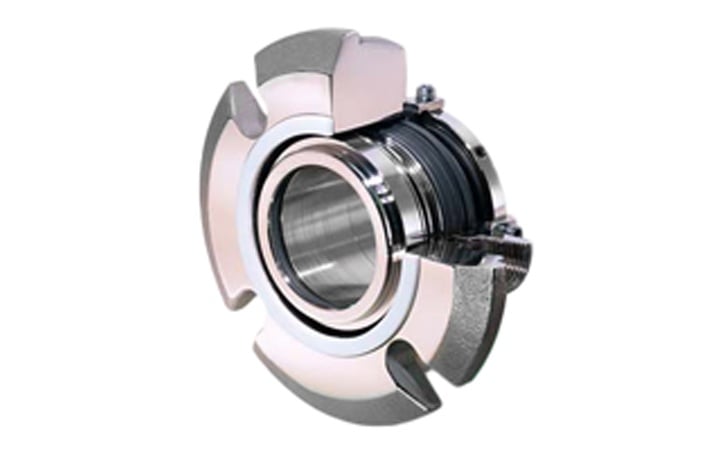
 If you’ve made the switch from packing to mechanical seals, you understand the positive impact mechanical seals have on your systems. One of the main reasons to switch to mechanical seals is the drastic reduction in leakage, which in the long term, saves maintenance valuable time and money.
If you’ve made the switch from packing to mechanical seals, you understand the positive impact mechanical seals have on your systems. One of the main reasons to switch to mechanical seals is the drastic reduction in leakage, which in the long term, saves maintenance valuable time and money.
Mechanical seals are devices that seal machines between rotating parts (shafts) and stationary parts (pump housing) and are an integral part to the pump. Their main job is to prevent the pumped product from leaking into the environment and are manufactured as single or double seals. What's the difference between the two?
A single mechanical seal consists of two very flat surfaces that are pressed together by a spring and slide against each other. Between these two surfaces is a fluid film generated by the pumped product. This fluid film prevents the mechanical seal from touching the stationary ring. An absence of this fluid film (dry running of the pump) results in frictional heat and ultimate destruction of the mechanical seal.
Read more about reasons why mechanical seals self-destruct on our blog.
Mechanical seals tend to leak a vapor from the high pressure side to the low pressure side. This fluid lubricates the seal faces and absorbs the heat generated from the associated friction, which crosses the seal faces as a liquid and vaporizes into the atmosphere. So, it's common practice to use a single mechanical seal if the pumped product poses little to no risk to the environment.
A double mechanical seal consists of two seals arranged in a series. The inboard, or “primary seal” keeps the product contained within the pump housing. The outboard, or “secondary seal” prevents the flush liquid from leaking into the atmosphere.
Double mechanical seals are offered in two arrangements:
Double mechanical seals are commonly used in the following circumstances:
Are you still using packing for your pumps? Read about the differences between packing and mechanical seals to see if switching to mechanical seals makes sense for your plant. A qualified engineer will help you decide which type of mechanical seal is best for your application.
These Stories on Mechanical Seals
Headquarters and Service Center
Located outside Green Bay, WI
707 Ford Street
Kimberly, WI 54136
920-733-4425
OptiFlow Design and Build Center
1002 Truman Street
Kimberly, WI 54136
920-733-4425
Burnsville Service Center
12265 Nicollet Avenue
Burnsville, MN 55337
952-444-1949
Grand Rapids Service Center
26489 Industrial Blvd
Cohasset, MN 55721
952-444-1949
© Copyright 2024. Crane Engineering. All Rights Reserved. Privacy Policy.